
1925 - 1931
Thoreau Had a Pond -- I Had a River

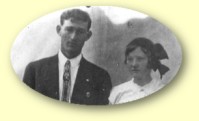 Sterling and Etta Ward Keener
|
We were children of Etta Ward and Sterling Keener, and were born just before the Great Depression. There were four of us: Dennis and Leo (born 15 months apart in 1915 and 1916); then eight years later myself and Opal (23 months apart, born in 1925 and 1926). Dr. Yarnell was in attendance for our entries into the world. |
|
Dennis and Leo were born in a small house located near the Spokane River just across the bridge at the area of Trent (now called Irvin). |
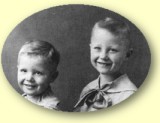 Leo and Dennis Keener
|
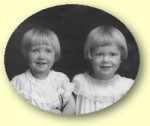 Opal and Leta Keener
|
The Spokane County Road Department surfaced Trent Road with concrete in 1923. The old house in which we girls were born was located on Trent one mile west of Irvin and one mile east of Millwood. Our family moved from that house when I was less than four years old. However, I can still remember a few incidents from my early years when I lived there. One of which was seeing my mother nursing my baby sister, and I wondering what was going on! |
That house had a wonderful upstairs where the four of us played hide-and-seek. Probably my propensity for liking to be scared began back there in that time.
And once when my mother was baking sugar cookies, I planned to abscond with a few of those fresh-out-of-the-oven morsels and run away from home. I could see a sunny hill in the distance, and I wanted to bask awhile in the sunshine, eat cookies, and ponder about life. A walk in the direction of the hill brought me up short with the realization that my scheme wouldn't work. The Spokane River ran between me and the hill!
Riblet's mansion was built on that hill in 1924, the year before I was born. I was fascinated with that mansion, and have always yearned to see the interior. They say it holds many unusual inventions of Royal N. Riblet.
To the people of Spokane, Riblet means a mansion on a windy cliff just above the Spokane River east of the city. To engineers, Riblet means tramways, including the gondola ride in Riverfront Park; to ski-run developers Riblet means chair lifts--more than 400 in every part of the United States.
Although the Spokane Portland Cement Company was situated across the river below their property when the Riblets built, they periodically sued for damages done by cement sediment accumulating on the basalt rock, and on their holdings. They were never successful. At one time the property was priced to sell at $175,000; I don't know whether it was sold at that time or later, but it has become the property of the Arbor Crest Winery, and grapevines planted there.The Spokane Valley floor was covered with gravel and boulder deposits, remnants of the ice age. Montana glaciers released a tremendous force of rushing water more that 4,000 feet deep. Those glacial floods pushed west from the Clark Fork River which resulted in creating the Spokane River. Gravel and rocks were washed into the valley and deposited on the valley floor. Of the early settlers in the valley, the Irish made use of the rocks by creating fences outlining their property, while the German people tended to pile them in the center of their lots, pyramid-fashion. Their philosophy probably being that the center of their land was the shortest distance to move them. (Taken in part from "Otis Orchards: The First Fifty Years," by Mary Hanly Berglund.)
I have battled the small, gravelly rocks, and even larger rocks, in my flowerbeds for years.
We moved from Trent to the street behind, Empire Ave, which was adjacent to the Spokane River. There I spent my childhood and teen years.
Our new house had a small rental house on the back of the property which we leased out to a family named Casey. They had a girl, Sylvia, and a boy they called "Bo." Opal recalls that our father once said, "If they miss one more rent payment, I'll tear down that house!" They did, and had to move, and the house was torn down.
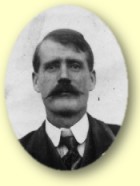 T. A. Ward
|
Very soon, my grandparents, T. A. and Lucy Ward built next to us on the acre and one-half adjoining ours. The garage of their house served from time-to-time as living quarters for a variety of drifters (boarders) or also on occasion, to a relative. The house itself was completely and solidly built by relatives and neighbors. One neighbor, Mr. Newsom, did the plastering. It was his first endeavor, and it is still holding up. In 1946, when my grandmother, Lucy Ward, died, their house many years after being built was to become my house. |
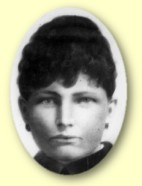 Lucy Robbins
|
While I was very young, there occurred an incident I would like to have forgotten. Probably out of necessity , my grandparents were quite skilled hunters. This day I was sitting on a deer hide in their backyard. I noticed a nearby, convenient hatchet that I was inclined to try to use on something -- this little part-Indian girl made quite a lot of slashes in the deer hide before she was caught up with.
As a little girl, I was constantly sucking my thumb. Mother despaired of ever breaking me of the habit. But once, she told me, I stood by the cook stove watching her fix dinner. I accidentally fell against the hot stove and burned my thumb quite severely. Mom was almost gleeful as she put medication and necessary bandages on my burn, probably thinking, "Ah, now Leta won't be able to pursue her little habit anymore!"
She said she was brought back to reality, though, when after a moment of looking at my bound-up right thumb, I immediately "popped my left thumb into my mouth!"
I was playing alone on the land in back of our house, just above the Spokane River, and I had very strong conviction. It was: "I have always existed, always shall, and I cannot die." From that time, I have felt that my spirit will never cease to be. It has always existed, and it always will exist. I believe that very young children have not been taught fallacious reasoning, and so have a perception into areas that can't be rationally explained. Perhaps my Indian heritage was responsible for this revelation, and it was a sort of Vision Quest.
|
Our family drove to Wellston , Oklahoma , and Rogers, Arkansas, to visit with Father's people when I was four years old. Grandpa Keener (Jerry Martin) was one-half Indian, as he had a full-blooded Cherokee mother. I guess that would make me 1/8th Cherokee. |
 Jerry Martin and Melvina Brown Keener
|
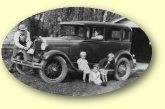 The New Studebaker
|
We traveled as stylishly as anyone on the road: A new Studebaker with eisenglass windows, our "grub box" on the running board, and our canvas water bag cooling in front on the radiator. Our accommodations were tourist cabins. Tourist cabins were very simple structures, supplying everything but food. |
While in Oklahoma, we were caught in a terrific storm. As we watched from our cabin door, torrents of red mud streamed down in the road outside. We had to stay put until it subsided, and then, on to Wellston, Oklahoma.
At my grandparents' home, our family slept upstairs in soft featherbeds. Very convenient in emergencies; my mother kept one in our closet back home.
Grandma Melvina Brown Keener had a large nose! I noticed, and told my parents innocently, "I don't like Grandma Keener because she has a big nose!" I didn't get away with it, because they told her what I had said. I was mortified! Everybody else laughed.
Mosquitoes were a problem at one point in our travels. I was bitten so badly that my leg was swollen and I had to keep it elevated. Leo remembers seeing me walking along with a bouquet of wild flowers in my hand, hitting at the myriad of biting, stinging insects. That day I said, "I want to show Grandma (Ward) my leg," forgetting we weren't next door to her anymore, but a couple thousand miles away.
On the journey home, Dad was telling all of us something in great detail, when one of the boys read a road sign that told us we were approaching some rocks with an unusual name. "Hoo Doos" read my brother. Dad, interrupted in his thoughts replied, "Well, everybody doos!"
Dad was very special to us. He built interesting toys. We had a large tree house high in our willow tree. It had benches around all the sides. Mom was often to be found up there with her letter writing or reading. Once she was alone on a day when it was otherwise quiet, and she heard someone coming up the ladder. She was amazed to see that our big police dog, Ted, had made it up the ladder to be with her. After that, Ted often climbed up to become part of the fun.
Daddy made a bookcase with glass doors in which we kept many interesting books: Robert Louis Stevenson's A Child's Garden of Verses, The Hardy Boys and Nancy Drew books, and a book with a red cover picturing an eagle on front -- I can't remember what the title of the book was.
We loved a little blue doll bed he made for our dolls. Those days, dolls had composition heads, arms and legs, and cloth bodies. They didn't drink, wet, open and close their eyes, and couldn't say very much, just "Ma-ma" when you tipped them down and up again.
We had a rugged toy 'rocker' that he made from one round piece of a wooden cable reel. It was cut down the middle and the two half-rounds were put together as rockers. Inside was a floor with seats on each side. There was a pole through the top center to hold onto. We could really make it go! We called it our merry-go-round.
Dad was proud of his car. In that time, the battery was located under the floorboards in the front part of the car. On this occasion Dad wanted to check the battery and lighted a match, The gas fumes ignited and the resulting fire whooshed up in his face and "singed all his long eyelashes off," according to the story circulated in the neighborhood.
Opal and I were called 'the Janes' by our father. íJaneí was a slang word for girl which originated about 1915. I could never figure why he called us both by the name of Jane! Daddy held us on his lap and sang to us. One of his songs was:
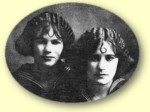 Donnie and Bonnie
|
We had twin aunts on our father's side--girls named Bonnie and Donnie. Mom had always hoped for twin girls, and so, dressed alike, Opal and I were more often than not referred to as the "Keener twins" as we walked down Empire to Millwood and wherever else we went. Opal tried to walk tall to appear closer to my height, and I hoped to look shorter by scrooching down. Our blond hair was styled in the "windblown bob" cut, shingled at the back, and very popular at that time. Mom sewed our dresses most of the time. Opal with her blue eyes was dressed in blue, and I with brown eyes usually wore pink. |
In Millwood, one mile away, Chester Buckland, President of the Inland Empire Paper Company, had three daughters--two of whom were twins. The twins were identical, and very well-known around Millwood. They attended West Valley High School the same years that Opal and I did. Their names were Mary and Sally. They were so close that when something happened to one, the other knew about it even though Mary lived in Millwood and Sally lived across the state in Bothell.
At times I was a terrible brat. "Usually, " I should say. Of course, we didn't have much money, and Daddy sometimes gave us pennies. I became angry once when he gave me pennies, and threw them on the floor because I felt they weren't enough money.
Another "bratty" performance was at Christmas when I was checking out Mom and Daddy's closet for toys. Sure enough, there I found presents. But they were, I could never have imagined this, two black babydolls. I was so intimidated by them that I burst out crying. Mom grew up in Oklahoma, and had a great soft spot in her heart for cute "negro" babies. I don't know how the dolls disappeared, but we didn't have to "mother" them; and I have always felt bad that I was so rotten to my mother.
I always loved to create and sew, and from the time I was just able to reach the treadle on Mom's Singer sewing machine, I happily made all of my dolls' clothes.
Mrs. Jones was a neighbor and wonderful lady who loved to see Opal and me -- we felt quite pampered when visiting her. She gave us many little gifts, among which were hand-made petticoats with pink roses and lace, and she also gave us each a pretty wooden box to keep treasures in.
|
In the summer our families, my mother's relatives, had reunions. Sometimes they were in Palouse in the home of Aunt Ettie (Grandpa Ward's sister) and Uncle Jim (Grandma Ward's brother). Their children and my grandparents' children were double cousins; meaning they were of the same blood as brothers and sisters. |
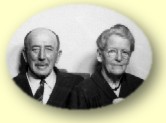 Jim and Ettie Robbins
|
Uncle Jim Robbins had come to Spokane from Oklahoma ahead of his bride-to-be. Jim's parents were already in the area. When situated, Jim sent for Ettie to join him, and she arrived by train. She was just sixteen and was handicapped with a birth defect, a club-foot. When she arrived she looked around for someone to meet her, but no one was in sight. She went to one of Spokane's magnificent hotels where she was allowed to stay in exchange for work. I was told it might have been the Davenport Hotel, but I have found that the year Louis Davenport came to Spokane was 1889, while Jim and Ettie were married in 1888. Uncle Jim did find her; Spokane was not very populated then. They went to Rathdrum, Idaho, to be married.
 Thomas Alvie and Faye Ward
|
In cold weather, neighbors were often invited to my grandparents' house for dance parties. Even though the house was small, quite a lot of people enjoyed music, dancing and refreshments. Uncle Alvie played banjo and fiddle, Uncle Perry played guitar, Mom played the organ, and sometimes Grandpa played along on the Jew's harp. |
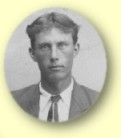 Perry Ward
|
Furniture was rearranged in the house and benches were moved in to accommodate everyone. When we children became tired, we went into a bedroom, and, snuggling amid the array of coats, hats, scarves, etc. we quickly drifted off to sleep, lulled by the music.
With our grandparents, we made several trips to Oregon forests where camps were set up for woodcutting. I don't remember that we brought home any wood; however, there was a woodsaw in back of their house where my grandfather and uncles cut wood for themselves and for others. The high-pitched squeal of the saw as logs were cut into firewood lengths could be heard all over the neighborhood. People in this part of the country cooked on woodstoves and heated houses with wood and coal.
Grandma Ward made her own soap. She made it from animal fat and lye (made from ash), I think. What a mess that must have been! She worked outside over a kerosene stove.
I mentioned earlier that my grandparents took in an occasional boarder. Their garage was equipped with a sink with running water, a cook stove, table, chairs, a bed, and a closet. Opal and I became acquainted with Cobb Sanders who lived there. He brought us candy bars -- always, we could be certain that come his payday, he would have two candy bars for us. One time he came in from work very drunk, and we had some doubts as to whether we could expect our usual treat, but it was payday, and he had two Milky Ways, sure enough. They had been in his back pants pocket, and were very, very squished!
|
Mom's cousin, Dan Robbins, also was an occasional tenant. He was a little 'slow' and very obese! Because of this, he was teased, and that would usually make him angry. The song "Old Dan Tucker" when sung in his presence would put him out of sorts. And at mealtime, someone might arrange all the serving spoon handles pointing in his direction, and when he noticed it, he always grumbled. |
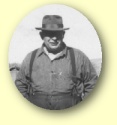 Dan Robbins
|
Sometimes we would catch Dan on a summer day asleep on the grass. We just had to set the lawn sprinkler close by, then turn on the water.
Dan was fond of Opal and me--we always received Christmas presents from "Big Santa." One day he disappeared and no one in the family knew where he had gone. We didn't know even if he was alive. It was many years later when he was discovered to be living in Cle Elum, Washington. He worked for the railroad and lived in a bunkhouse.
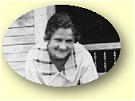 Ida Ward
|
Our Uncle Perry Ward' s wife, Aunt Ida, disapproved of us, or so it seemed to Opal and me. They didnít have children of their own. Ida was the one who told us there was no Santa Claus. She said, "It' s only your father and mother who give you those presents." It was a surprise to us, but we readily accepted it as fact -- not especially despondent to learn one of the first 'facts-of-life.' Our Uncle Perry died first, and when Aunt Ida died, she left their assets to be divided between 16 nieces and nephews. |
Opal reminds me of her chagrin when come summer she would see Grandma setting up a big tent in her front yard. Grandma liked to sleep there on hot nights. Inside the tent was a double bed, an electric light, and bookshelves. Occasionally when Opal or I condescended to sleep out there with her, we were captivated by the insect noises around the light, the smell of the tent in the fresh, night air, and the feeling of security of being with someone we loved and trusted.
Grandma was an 'avant-garde women's-libber' and between Grandpa and her, she seemed to be the only one employed. She was a a photographer in her early years. And later was treasurer of the Irvin Water District; a job she held for several years. She drove a 1932 Chevrolet (Grandpa didn't drive). She was religious and taught Sunday School at the Congregational Church in the area known as Irvin. I was on the "Cradle Roll" of that church, and there I learned the Beatitudes, 23rd Psalm, and other Bible verses.
The church was located across from the old Trent School where I went for eight years. The old school was torn down and replaced by a large, modern building where later my children went to school. Also no longer remaining; the Congregational Church of my past; it was remodeled into a home, and later it was demolished.
My grandparents had an old roll-top oak desk. It had a built-in cabinet with glass doors above it. They had an Underwood typewriter, an organ, and a Victrola. Opal and I used to play records on their Victrola. The old Edison records it held were about 1/4" thick. Unbelievably, we were able to find some of these types of records in a museum in 1988, in Wallace, Idaho.
Our favorite record was "The Preacher and the Bear." We played that one soooo many times; I'm sure it frazzled Grandma's nerves. She was often cross with us. Maybe it was justified.
I spent many happy hours at Grandma's desk trying to learn to type. Now that I think of it, that would have been the perfect time to begin this journal! I would not have had to work my memory so hard.
We were pretensiously proud to be referred to as the knotheads or the brats by our revered older brothers. We knew they loved us and were also just a little proud of us.
Because I had these two much older brothers who enjoyed teasing me unmercifully, I had a temper. My brothers were constantly teasing and my only recourse was to fight back. However, they were able to hold me at arm's length during these squabbles, and that really infuriated me.
My temper would instantly flare whenever a boy made me angry. I have a scar on one knee that I got from chasing after one kid, and skidding into a fall. Then, Gordon Cole made an unfortunate remark as we were walking to school. He said, "I know someone I'm not afraid to fight!" and he was looking squarely at me. I hit him hard in the face, giving him a bloody nose. He ran home to his mother and I immediately felt remorse, as he was a couple of years younger than I.
We attended Bible School in the summer and Mom played a special march on the piano for the children as they marched into church. She was a good pianist, playing entirely by ear: "Dark Town Strutters' Ball," "Alexander's Ragtime Band," "Should I?" "Nola," "Twelfth Street Rag, " "The Old Rugged Cross," and "Beautiful, Beautiful Brown Eyes."
Mom sang a song that I have never heard of before or since. It went --
Opal and I had a strange duo of pets -- a duck and a chicken who were constant companions. We thought the chicken considered herself to be a duck too, because whenever Daddle ventured into the sprinkler for a quick dip, Dickie would follow along as complacent as could be!
The garden used to be a fun place to play. We loved to get inside the tepees formed by bean poles. The little scraps of broken dishes we salvaged were used just as if they were a beautiful set of doll dishes.
Our home was heated by a Heatrola wood and coal stove. Opal and I would lie in bed on cold mornings and chant over and over, "Is the fire hot?" Only when Dad finally would answer "Yes" would we haul ourselves out of our warm bed and stand near the heater to dress.
My cousin, Betty Johnson, was a good friend. She was the only girl cousin my age. When we visited her, we played upstairs and I loved to play with a little dresser that had an attached mirror. Betty contracted pneumonia and was hospitalized. We visited her in the hospital and she told us she was supposed to blow up some balloons, but she was unable to do it. She subsequently died from the illness.
Before I reached school age, I had a severe case of scarlet fever. Opal, of course, caught it from me, but she had a light case. There was a Quarantined sign on our front door. I had a deep-down feeling that I might not live, but I wasn' t really worried about it. People gave me pennies, and my Dad said, "You now have enough money to buy a loaf of bread." I was impressed!
When I began feeling better, I got out of my bed and brought a bottle of home-brewed root beer up from the basement. I opened it and poured it into several glasses; then I went outside to have everyone come in for a treat. Needless to say, they hurried me back to bed and no one wanted to touch my well-intentioned root beer treat. I then suffered a so called set back and was again quite sick. I became so underweight that concern was expressed when I started first grade.
Most families have a dish or two that serves as a sort of love medicine offered to a family member who is feeling under the weather. Ours was milk toast. Thick slices of home-made bread, oven toasted and buttered, were broken up in good, hot milk. It was comforting to the spirit as well as the tummy.